2020 Year in Review: Frenzied Lawmaking and Tender Moments in Tense Session’s Final Hours
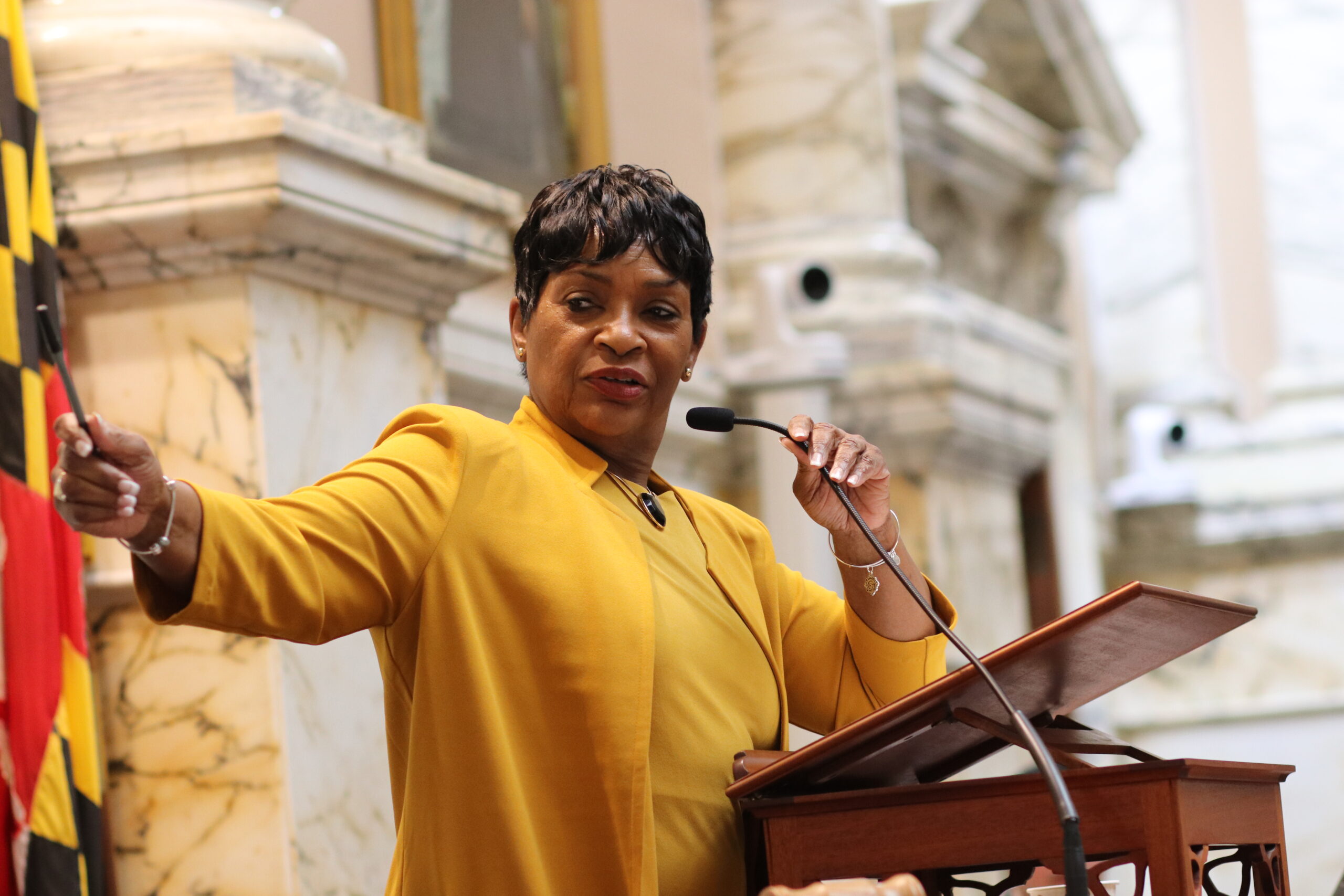
Editor’s note: Between now and Jan. 3, we’re re-running 12 great stories that appeared in Maryland Matters in 2020, in chronological order. On Jan. 4, we’ll provide links to our best-read stories of the year. These are the stories you made possible by supporting our independent nonprofit newsroom. You still have time to make a tax-deductible contribution before year’s end.
This story, which first appeared on March 18 with the headline “Frenzied Lawmaking and Tender Moments in Tense Session’s Final Hours,” captured the final moments of the pandemic-shortened 441st session of the Maryland General Assembly.
The Maryland General Assembly adjourned in a most unusual way on Wednesday, with sunlight breaking through the Tiffany glass chamber ceilings and polite applause replacing the typically boisterous final moments at midnight.
The House and Senate adjourned indefinitely at 5 p.m. from chambers barren of well-wishers, family members or the general public, after a session defined by Kirwan and the coronavirus.
Having met for 71 days ― a session cut three weeks short by the global COVID-19 pandemic, lawmakers over the final 72 hours of the 441st General Assembly passed an expansive education reform plan proposed by the Kirwan Commission, a $440 million revenue plan to fund the reforms and several pieces of emergency legislation to address the disease outbreak.
Fewer measures passed in 2020 compared to previous sessions, but lawmakers worked at break-neck speed. More than 660 bills received final passage between Sunday and Wednesday.
Del. Jason C. Buckel (R-Allegany) referred to Wednesday as the “pandemic Sine Die.”
The chambers were guided through the chaos by House Speaker Adrienne A. Jones (D-Baltimore County) and Senate President Bill Ferguson (D-Baltimore City), both serving as presiding officers for the first time in 2020.
“We lost a couple of weeks, but we were able to get a few good bills done,” Jones told reporters moments after the session wrapped.
She was honored with a standing ovation by House members ― as was Ferguson across the hall.

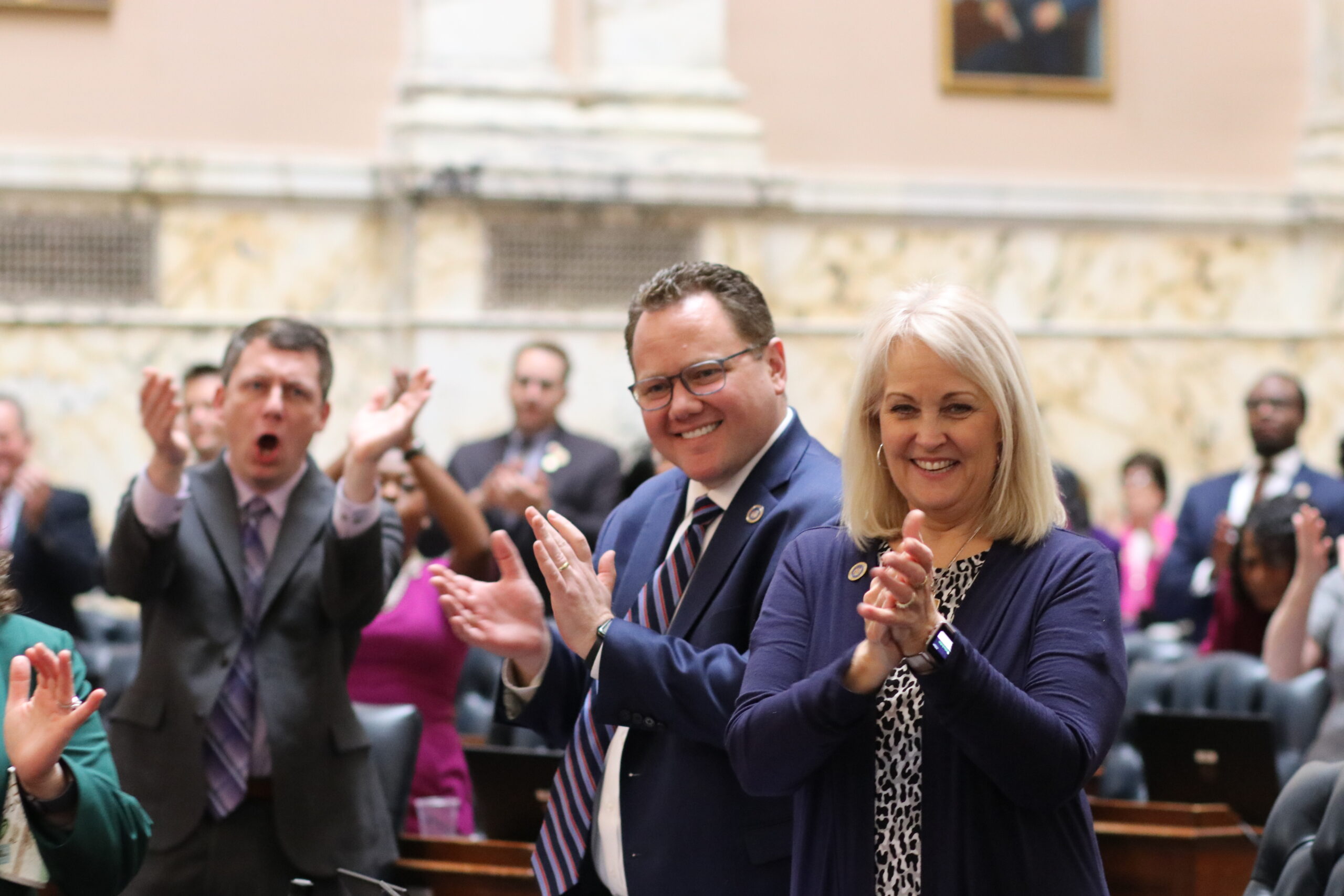
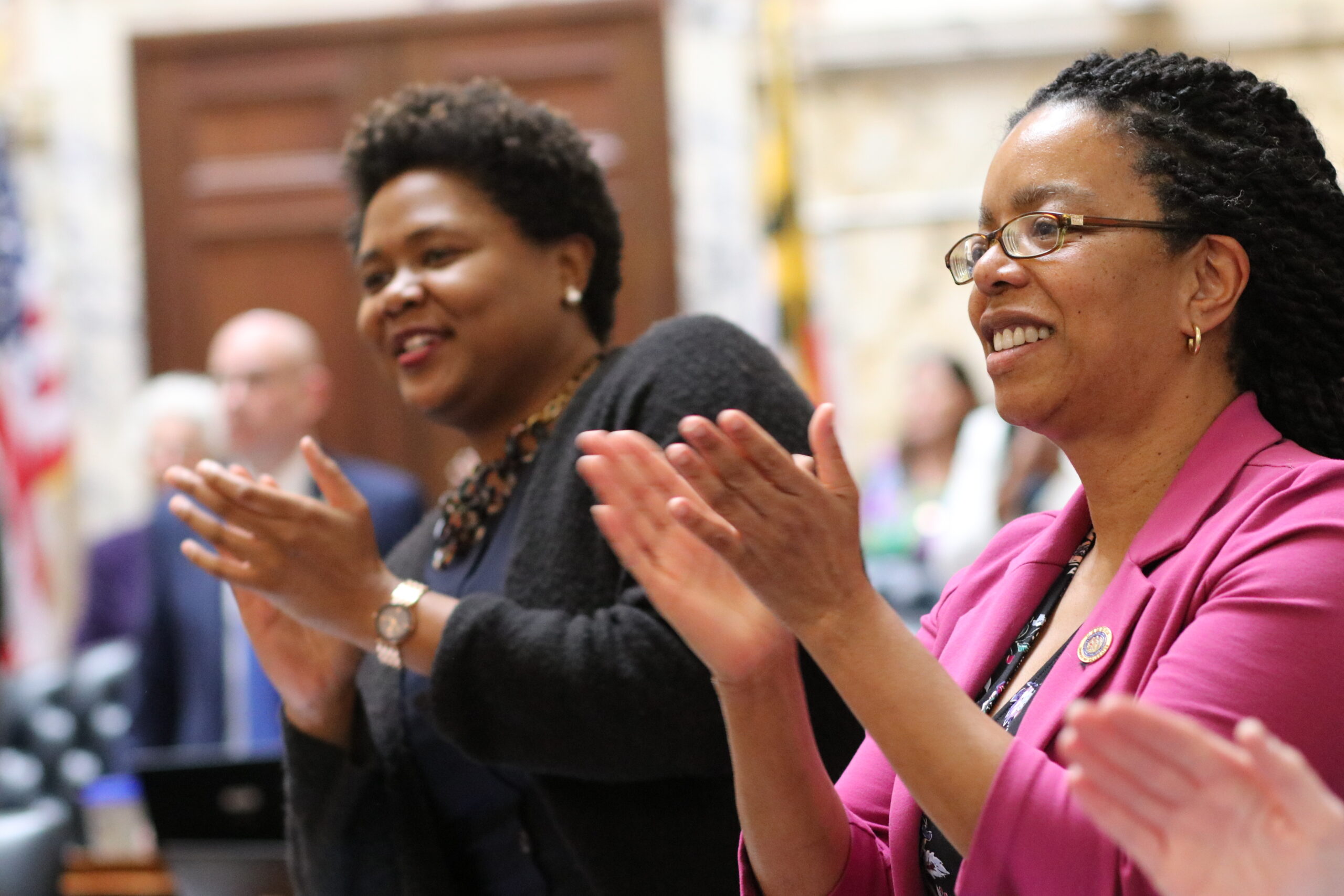
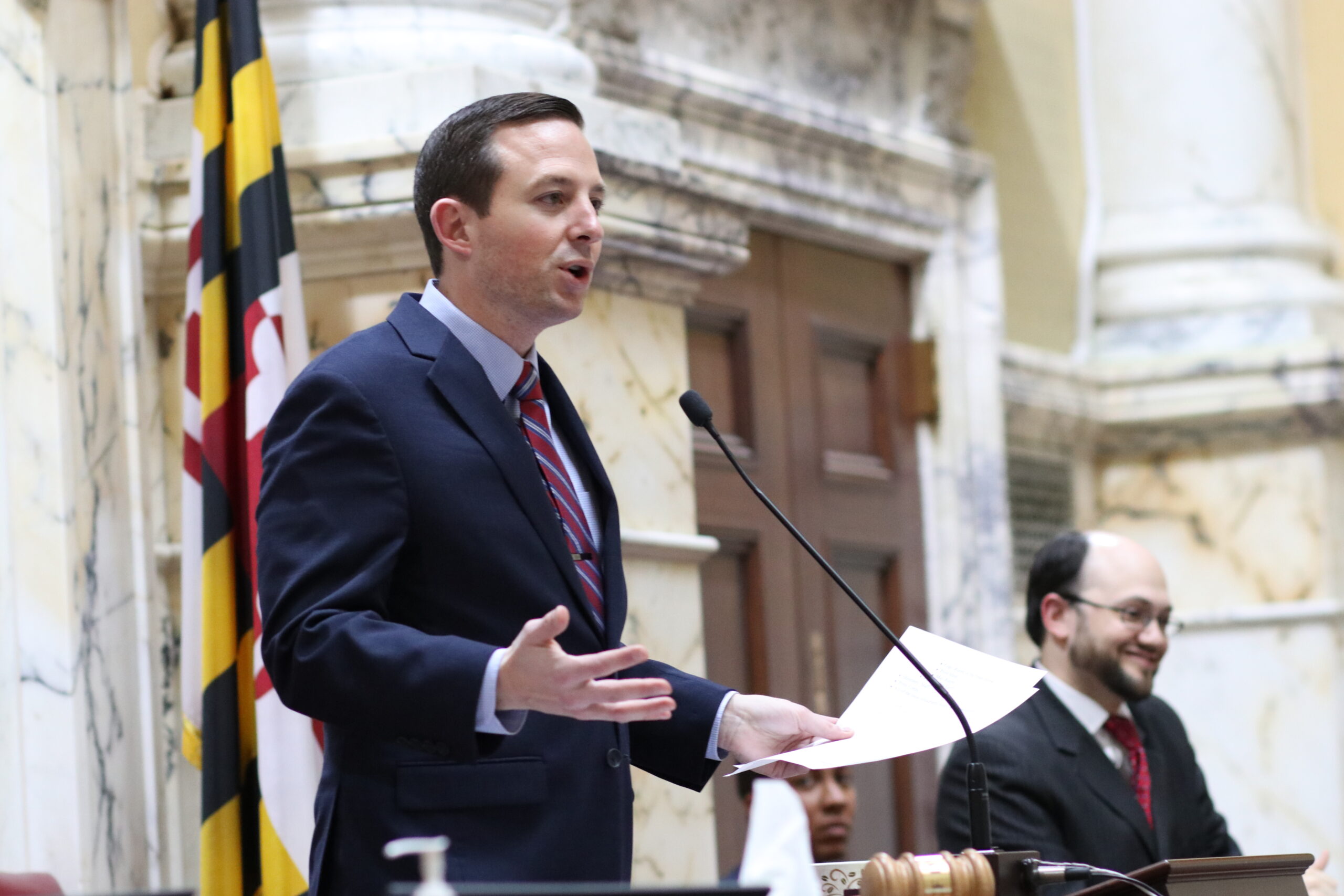




In his closing remarks, Ferguson reflected on the unique challenges of the session and took a teary pause.
“It’s just tough not to see the president emeritus here,” he said, his voice breaking. “This has been one for the ages. And I know if he could be here, he would be proud.”
Senate President Emeritus Thomas V. Mike Miller Jr. (D-Calvert), who is fighting prostate cancer, has been hospitalized for pain in recent days, though he had told colleagues of both parties by phone that he hoped to get in for the last day.
Noting the portrait of Miller that hangs on the rear wall of the Senate chamber, Ferguson said, “He’s here in spirit.”
Ferguson commended lawmakers for coming together to solve major issues during the legislative session.
“We had hard conversations, but we solved problems,” he said. “…This is the place where the work gets done.”
Few of the bills taken up on the final day dealt with the COVID-19 outbreak, but reminders of the disease’s spread cropped up periodically throughout the day.
Sen. Edward R. Reilly (R-Anne Arundel) said he had received a call from a constituent who is having trouble getting a marriage license because the law says they have to apply in person. The county office they need to go to is closed.
Reilly said he would introduce a bill next year ― Senate Bill 1, he jokingly called it ― to allow people to apply online as long as they have certain paperwork.
Later in the day, Ferguson, in the middle of moving bills across the desk, looked at a text on his phone and announced, “There are no diapers in Cherry Hill.”
It was a non-sequitur, to be sure, but it was a reminder that outside the windowless chamber, anxiety across the state is mounting. Cherry Hill is a struggling neighborhood in Ferguson’s district.
Last minute successes ― and defeats
House debate on Wednesday was dominated by a mad rush to pass a proposed constitutional amendment that would expand the General Assembly’s budgetary powers.
The measure, which has been regularly introduced by both Republicans and Democrats in the Legislature for more than 25 years, would allow the General Assembly to increase or decrease line items in the state’s budget, but not exceed the overall spending level set by Maryland’s governor. It would also diminish the power the governor has over the budget process, the strongest gubernatorial budget control in the nation.
Republicans opposed the measure in part for the speed at which it zoomed through the chambers in the final hours of session, while the public was barred from the State House complex.
“This is the worst health crisis in all of our lifetimes, and we’re in this chamber, stuck here. Who knows who has coronavirus, could be any of us. We should be out of here already. Instead we’re passing unnecessary things like this,” House Minority Leader Nicholaus R. Kipke (R-Anne Arundel) said.
Democrats said it was important to pass the measure this year so it could be placed on the 2020 general election ballot, and not on the ballot in a future gubernatorial election year. The majority party pushed back against allegations that the bill was moving forward “in the dark of night.”
“This is the most transparent way to change laws, to change anything in the state. The most transparent way is to send it to the voters,” House Appropriations Chairwoman Maggie L. McIntosh (D-Baltimore City) said.
At least one Democrat agreed that the measure was rushed through too quickly. Del. Geraldine Valentino-Smith (D-Prince George’s) voted against the bill ― and moments later was relieved of her position as House chairman of the legislature’s Spending Affordability Committee.
In the Senate, there was last-minute furious debate over a measure to guide compensation for wrongfully convicted prisoners. Despite passing by a wide majority ― 123-9 in the House of Delegates on Monday ― a Republican senator’s filibuster kept the measure from passing this year.
The bill was renamed in honor of Walter Lomax ― a Maryland man who spent 39 years in prison for a crime he didn’t commit ― after he collapsed from a heart attack in the Miller Senate Office Building before a bill hearing earlier this session. In October, Lomax and four other men were the first exonerees to receive compensation from Maryland’s Board of Public Works since 2004.
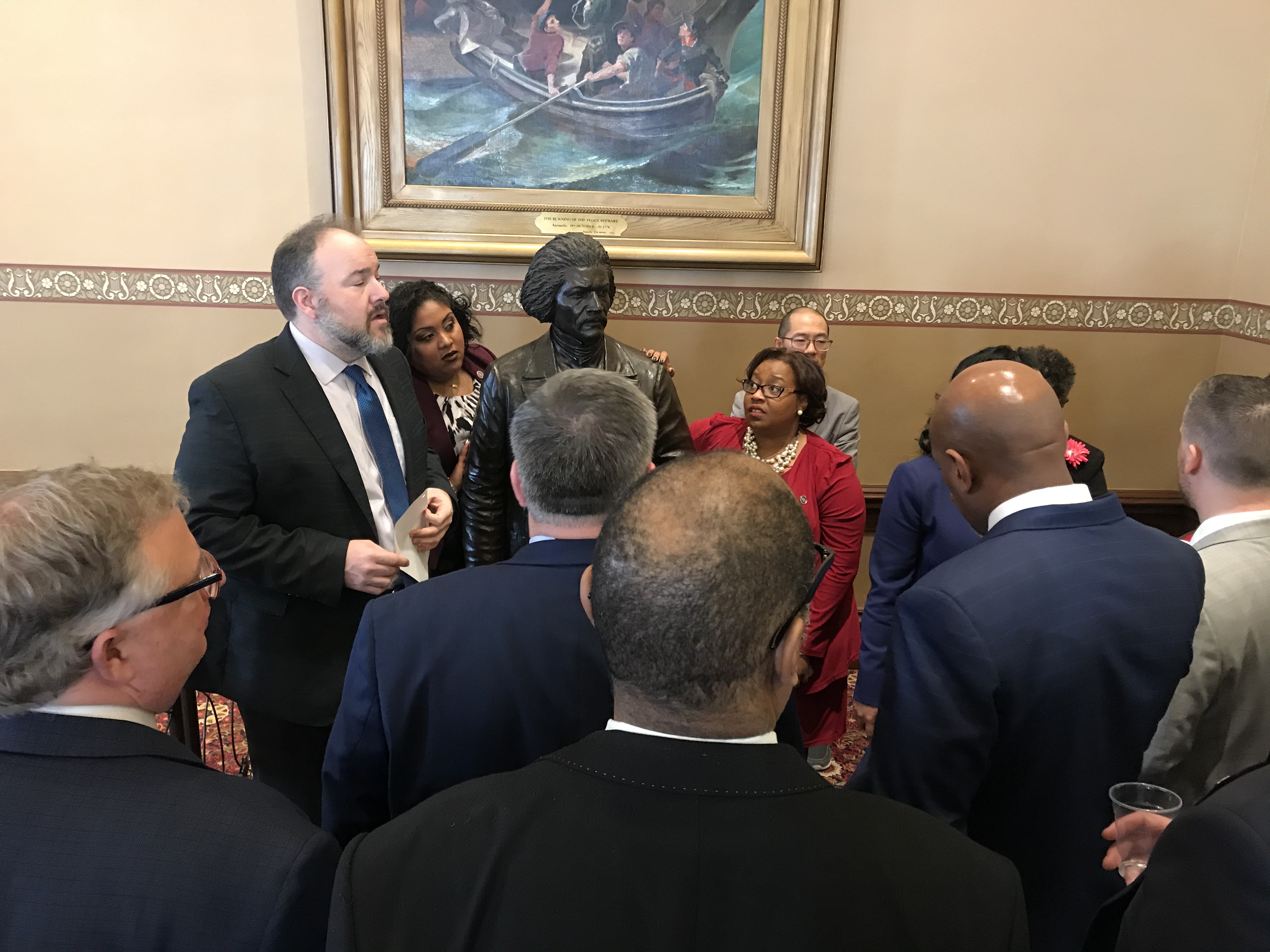
The House Judiciary Committee met for an impromptu meeting in the Old House Chamber, near a new statue of Frederick Douglass, during final bill negotiations on Wednesday afternoon. Photo by Danielle E. Gaines
In a sort of filibuster, Sen. Robert G. Cassilly (R-Harford) raised concerns about the potential of people abusing the system facilitated by “rogue” state’s attorneys ― citing, but not naming ― Baltimore City State’s Attorney Marilyn J. Mosby (D).
Earlier in the day, Mosby declared that city prosecutors would drop charges and release people held for nonviolent offenses in the face of the COVID-19 pandemic.
“It writes a blank check for that individual who has already clearly stated ― unambiguously ― that she does not care what we say,” Cassilly said. “She’s judge, jury, executioner. She’s designated herself in that capacity.”
“We’re handing her this state’s checkbook.”
Cassilly introduced two amendments to the bill, including one that would change the necessary burden of proof of a person’s innocence to receive compensation from a preponderance of the evidence ― meaning just a hair over 50% ― to “clear and convincing.”
Both amendments failed.
Also failed was an attempt by Democrats to speed the bill’s passage by allowing the chamber to vote on the bill twice in one day, causing the bill to die on the Senate floor.
One of the last bills to make it across the finish line would prohibit cabinet secretaries from lobbying in Maryland for 12 months after leaving the government.
House Bill 315, backed by Del. Vaughan Stewart (D-Montgomery), was amended in the final hours of the session to incorporate a Hogan administration priority, an increase in the penalties that can be levied against elected officials convicted of bribery.
The measure exempts former cabinet secretaries who go to work as a lobbyist for a county, municipality or a portion of state government. Nor does it bar former officials from running for the General Assembly.
While the bill doesn’t raise the fine for bribery by an elected official as high as the governor wanted, it does boost it considerably from the current range, $1,000 to $10,000. If the bill becomes law, the maximum fine would become $5,000 to $25,000, depending on the offense.
Two Maryland lawmakers were convicted of bribery in the last year, and HB 315 passed both chambers unanimously.
Lawmakers also overwhelmingly approved a piece of emergency legislation from Jones, Ferguson and Sen. Clarence K. Lam (D-Howard) that would prohibit price-gouging on products like food, fuel, cleaning products and medical supplies. The bill would also extend unemployment benefits to people who are quarantined or whose employers have ceased operations because of COVID-19.
Other bills that were passed would enshrine the key elements of the Affordable Care Act into state law and authorize the Maryland Stadium Authority to float $375 million in bonds to overhaul Pimlico Race Track, home of the Preakness Stakes, and Laurel Park, the state’s most lucrative horse track.
Gov. Lawrence J. Hogan Jr. (R) said on Tuesday that talks were underway to delay the 2020 Preakness until September, two weeks after the rescheduled Kentucky Derby, which has now been set for Sept. 5.
Tax and spend
The proposed $47.9 billion state operating budget, as well as a capital spending plan, saw final passage on Wednesday.
Lawmakers also passed a package of bills to raise revenues to fund education reforms by taxing digital downloads and increasing the tax rates for tobacco products.
The 21st Century Economy Sales Tax would apply the state’s 6% sales tax to downloads of products like books, music and streaming services. Lawmakers removed cable and satellite television from the bill, which is now expected to generate about $100 million annually.
The first year of revenue from the new tax will be dedicated to costs associated with the state’s COVID-19 response, while future years would be dedicated to education reforms.
Del. Mark N. Fisher (R-Calvert) said that was the “biggest shell game” he’s ever heard of.
“It’s ridiculous! Shame on you for raising taxes during a coronavirus epidemic, a pandemic,” Fisher said. “Shame on you!”
The bill passed 89-45, with a half-dozen Democrats joining Republicans in opposition.
The other major revenue-generating bill passed by lawmakers would increase the sales tax on tobacco and vaping products by about $90 million next year. The tax on a pack of cigarettes would increase from $2 to $3.75.
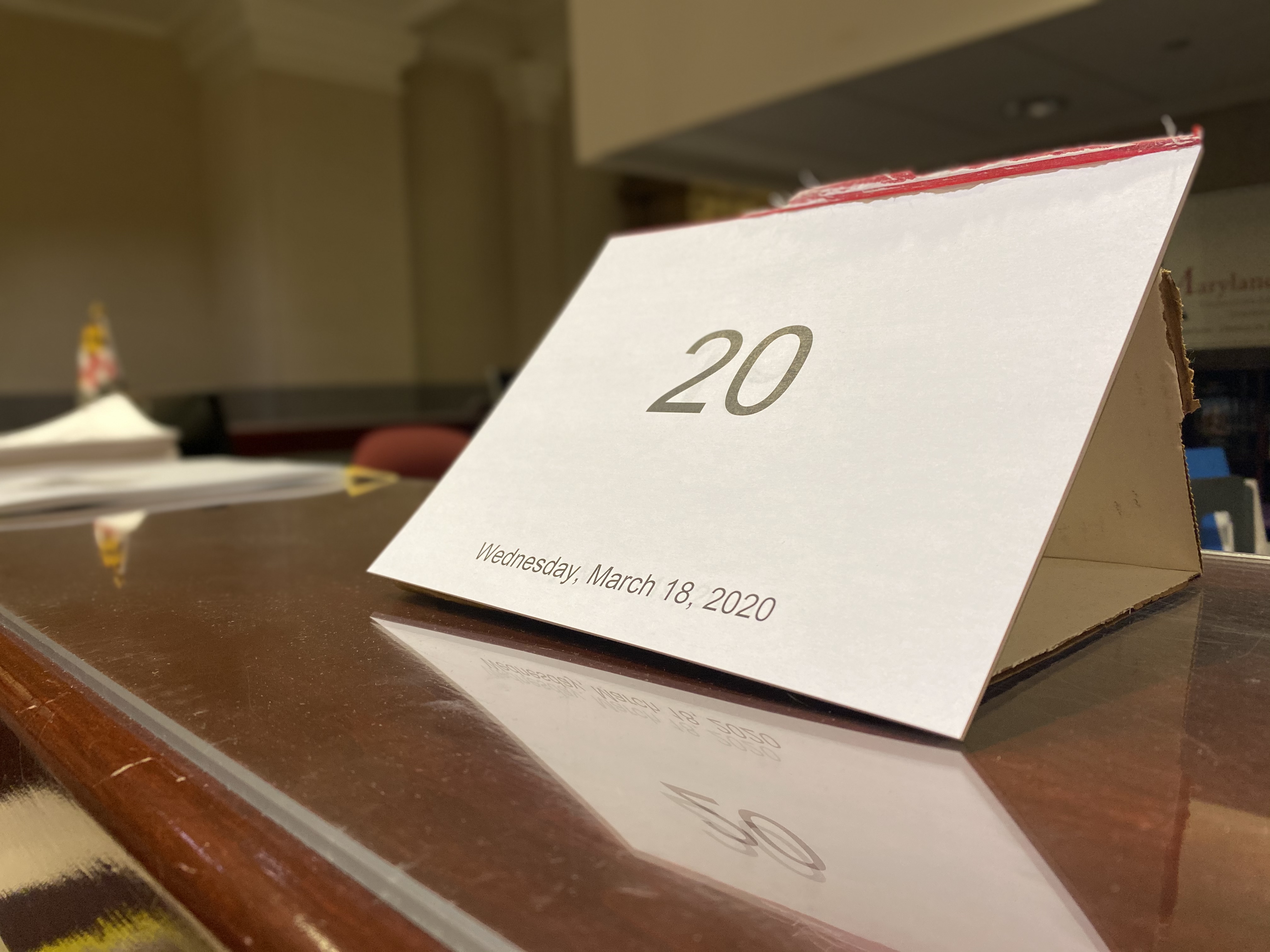
The daily countdown calendar remains on a State House information desk after lawmakers left Annapolis on Wednesday night. The session ended almost three weeks early due to fears over the coronavirus. Photo by Hannah Gaskill.
Tax revenue from tobacco products would be dedicated to increased funding at Maryland’s historically black colleges and universities in a bid to resolve a long-running lawsuit alleging inequities.
The measure would also impose a gross receipts tax on ads by digital platforms with more than $100 million in annual, global advertising revenue. It could generate up to $250 million a year, but is expected to be challenged in court.
Coming back?
Lawmakers passed more than 650 bills in the final three days of the truncated legislative session, including several measures sure to attract scrutiny from Hogan’s administration.
Jones and Ferguson said on Sunday that the General Assembly hope to convene in special session in late May, to take up any gubernatorial vetoes and other unfinished business.
Whether a late-spring special session is even possible remains at the will of the spread of COVID-19.
As lawmakers ambled out of the State House around 5:30 p.m., Hogan’s director of communications Michael Ricci, tweeted out a picture of canisters filled with the governor’s ceremonial bill-signing pens.
“To sign, or not to sign — that is the question,” he tweeted.
Josh Kurtz contributed to this report.





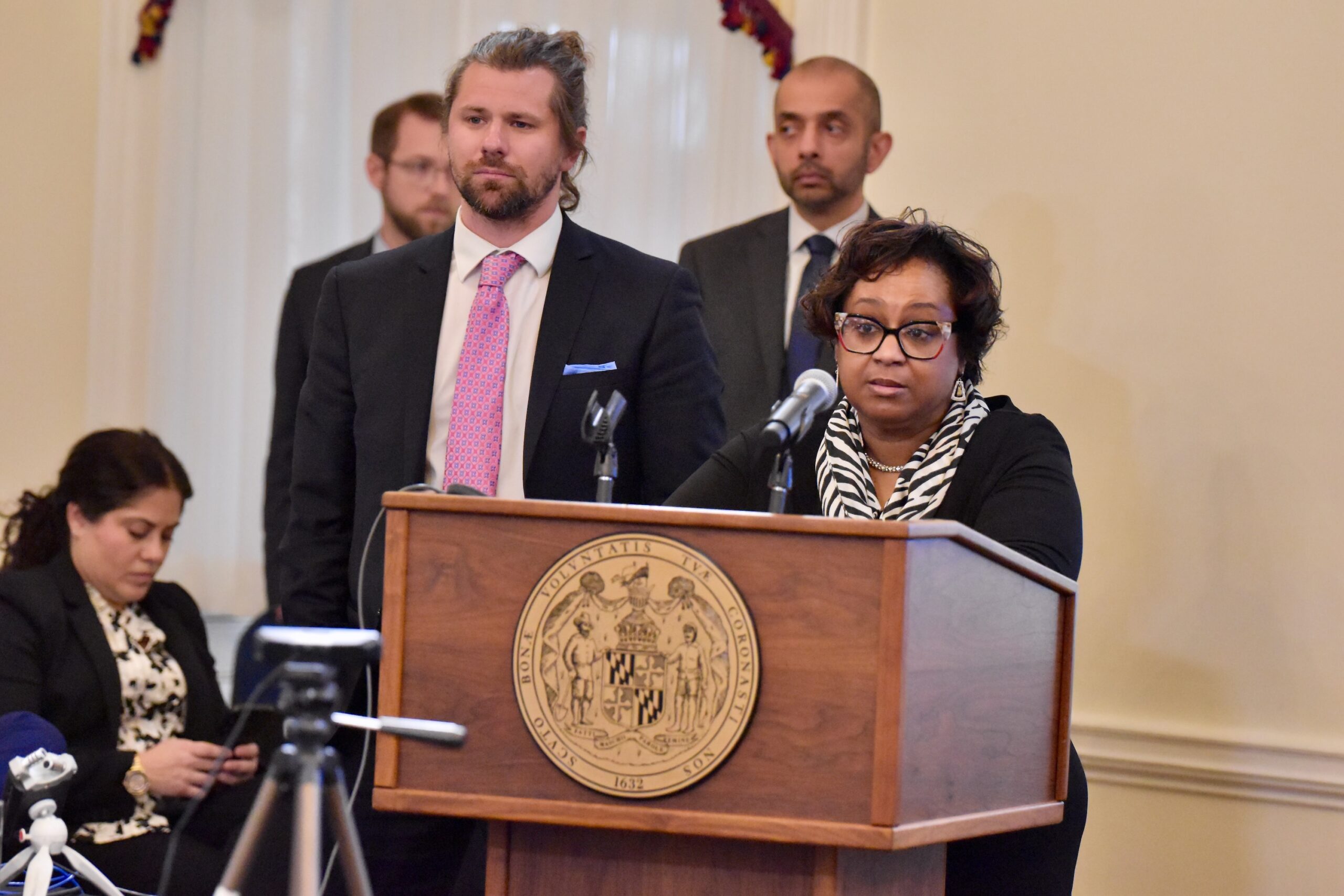
 Creative Commons Attribution
Creative Commons Attribution